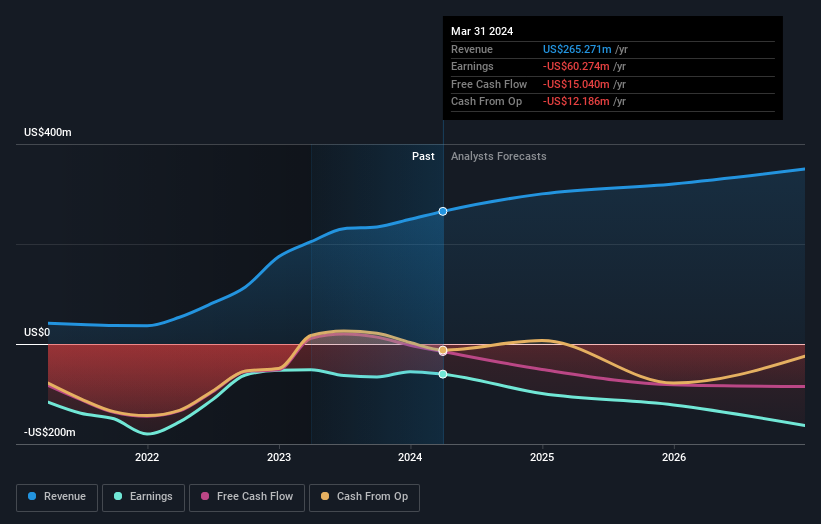Immunocore Holdings plc (NASDAQ:IMCR) shareholders are probably feeling a little disappointed, since its shares fell 2.1% to US$58.95 in the week after its latest quarterly results. Revenues came in 27% better than analyst models expected, at US$89m, although statutory losses ballooned 62% to US$0.62, which is much worse than what was forecast. Earnings are an important time for investors, as they can track a company’s performance, look at what the analysts are forecasting for next year, and see if there’s been a change in sentiment towards the company. We thought readers would find it interesting to see the analysts latest (statutory) post-earnings forecasts for next year.
See our latest analysis for Immunocore Holdings
Taking into account the latest results, the consensus forecast from Immunocore Holdings’ 16 analysts is for revenues of US$300.2m in 2024. This reflects a decent 13% improvement in revenue compared to the last 12 months. Per-share losses are expected to explode, reaching US$1.75 per share. Before this latest report, the consensus had been expecting revenues of US$289.5m and US$1.56 per share in losses. So it’s pretty clear the analysts have mixed opinions on Immunocore Holdings even after this update; although they upped their revenue numbers, it came at the cost of a notable increase in per-share losses.
There was no major change to the consensus price target of US$84.99, with growing revenues seemingly enough to offset the concern of growing losses. The consensus price target is just an average of individual analyst targets, so – it could be handy to see how wide the range of underlying estimates is. The most optimistic Immunocore Holdings analyst has a price target of US$100 per share, while the most pessimistic values it at US$67.16. There are definitely some different views on the stock, but the range of estimates is not wide enough as to imply that the situation is unforecastable, in our view.
Taking a look at the bigger picture now, one of the ways we can understand these forecasts is to see how they compare to both past performance and industry growth estimates. We would highlight that Immunocore Holdings’ revenue growth is expected to slow, with the forecast 18% annualised growth rate until the end of 2024 being well below the historical 68% p.a. growth over the last three years. Compare this to the 579 other companies in this industry with analyst coverage, which are forecast to grow their revenue at 19% per year. So it’s pretty clear that, while Immunocore Holdings’ revenue growth is expected to slow, it’s expected to grow roughly in line with the industry.
The Bottom Line
The most important thing to note is the forecast of increased losses next year, suggesting all may not be well at Immunocore Holdings. There was also an upgrade to revenue estimates, although as we saw earlier, forecast growth is only expected to be about the same as the wider industry. There was no real change to the consensus price target, suggesting that the intrinsic value of the business has not undergone any major changes with the latest estimates.
With that said, the long-term trajectory of the company’s earnings is a lot more important than next year. At Simply Wall St, we have a full range of analyst estimates for Immunocore Holdings going out to 2026, and you can see them free on our platform here..
You still need to take note of risks, for example – Immunocore Holdings has 2 warning signs we think you should be aware of.
Have feedback on this article? Concerned about the content? Get in touch with us directly. Alternatively, email editorial-team (at) simplywallst.com.
This article by Simply Wall St is general in nature. We provide commentary based on historical data and analyst forecasts only using an unbiased methodology and our articles are not intended to be financial advice. It does not constitute a recommendation to buy or sell any stock, and does not take account of your objectives, or your financial situation. We aim to bring you long-term focused analysis driven by fundamental data. Note that our analysis may not factor in the latest price-sensitive company announcements or qualitative material. Simply Wall St has no position in any stocks mentioned.


